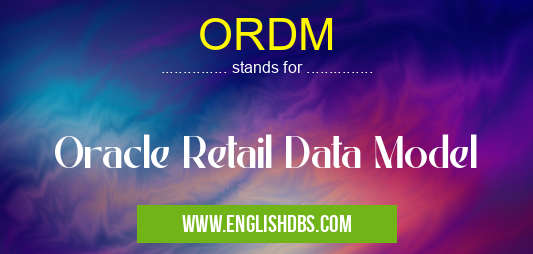What does ORDM mean in UNCLASSIFIED
ORDM stands for Oracle Retail Data Model. It is a collection of data models and related software that was developed by Oracle to help businesses manage their retail operations. The Oracle Retail Data Model provides an easy and quick way to get an overview of how the business should be organized and what data needs to be collected in order to run it effectively. With the model, businesses can create a comprehensive view of their organization's performance, as well as access detailed information about products, customers, transactions, suppliers and vendors.

ORDM meaning in Unclassified in Miscellaneous
ORDM mostly used in an acronym Unclassified in Category Miscellaneous that means Oracle Retail Data Model
Shorthand: ORDM,
Full Form: Oracle Retail Data Model
For more information of "Oracle Retail Data Model", see the section below.
Essential Questions and Answers on Oracle Retail Data Model in "MISCELLANEOUS»UNFILED"
What is Oracle Retail Data Model (ORDM)?
The Oracle Retail Data Model (ORDM) is a set of predefined data marts and associated ETL processes that enable businesses to accurately capture retail operations data, such as sales transactions, payments, returns and merchandise information. The ORDM can be used to help retailers to make better decisions that can improve their efficiency and profitability.
How does ORDM help retailers?
ORDM helps retailers by providing a comprehensive set of data elements and rules that are necessary for accurate capture, analysis, storage, retrieval and reporting of retail operational data. This allows retailers to gain insights into critical areas such as customer behavior, sales performance, store operations and inventory management.
What type of data can be captured using ORDM?
The ORDM is designed to capture all essential retail data including sales transactions, product details, customer profiles, promotional activities and payment information. It also provides advanced analytics capabilities such as trend analysis and predictive modeling which can then be used in decision-making.
Does the ORDM support integration with other systems?
Yes, the ORDM provides various options for integration with existing back-end systems such as ERP or POS systems. This allows companies to streamline their processes by unifying disparate data into a single platform for easier analysis and reporting.
Can the ORDM be customized?
Yes, the ORDM supports customization through its modular design which allows users to add additional fields or extend existing models according to their needs. This ensures that all business requirements are met while also taking into account different compliance regulations from different jurisdictions.
Is there a way to automate the ETL process with ORDM?
Yes, the ETL process can be automated using the built-in scheduling feature which allows users to define when each task should be executed. This eliminates the need for manual intervention which significantly reduces risks associated with manual errors in processing large amounts of data quickly and accurately.
Does the ORDM provide security features?
Yes, the ORDM provides various security features such as access control measures which restrict who can view or edit certain pieces of information at any given time. The system also offers role-based authentication so only authorized personnel have access to sensitive information within the organization.
Is it possible to back up an entire ORDM instance on another server?
Yes, it is possible to back up an entire instance of an Oracle Retail Data Model on another server using specialized software tools made available by Oracle. This ensures that all essential information is safe even in case of hardware or software failures making it easier for organizations to recover quickly from accidents or unforeseen events.
Does the Reporting module within the ORDM require additional licensing fees?
No, accessing reports generated through Oracle’s Retail Data Model does not require any additional licensing fees beyond what you have already paid for your main application license agreement when purchasing this model solution from Oracle Corporation or its affiliates.
Final Words:
In conclusion, Oracle Retail Data Model (ORDM) is an invaluable tool for businesses operating in the retail industry because it gives them a unified view of their entire operations from financials right through to customer management and supply chain optimization. It allows for predictive analytics which helps retailers anticipate problems before they arise and optimize their processes accordingly. As well as being highly scalable and open source so that integrating existing systems with ORDM has minimal effort required on behalf of developers or IT staff – all in all making it one of the most comprehensive models available on the market today.
